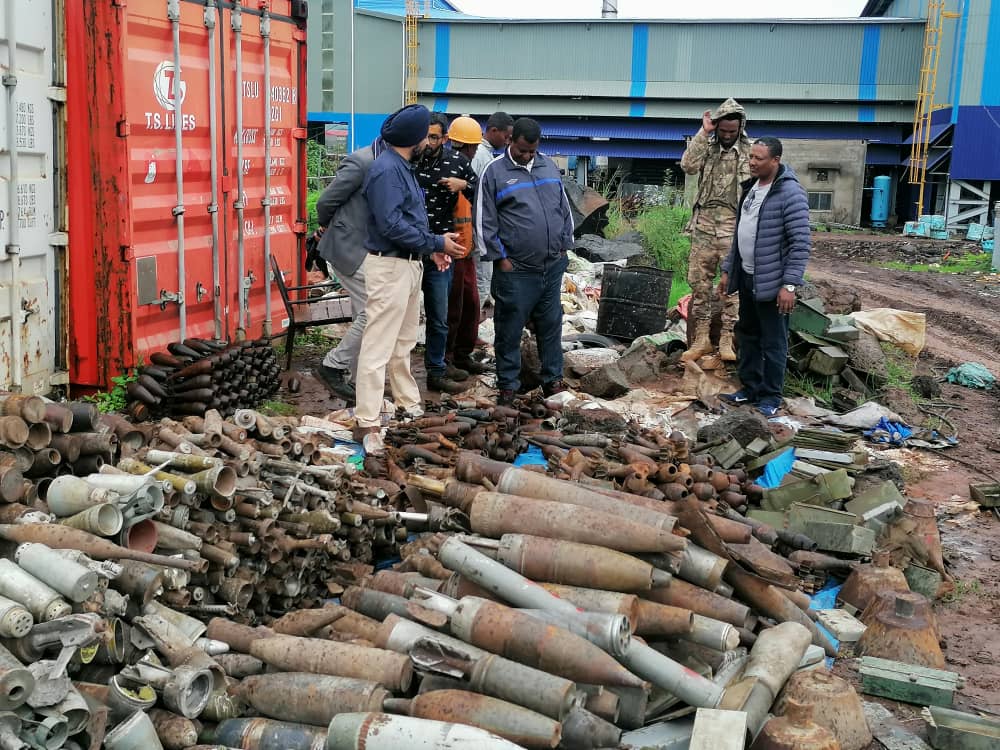ADF STAFF
Fourteen-year-old Abel and some friends were playing in the remote north Ethiopian town of Adi Hageray, in the Tigray region, when one of them found a new toy.
“We were throwing it at each other,” he told the International Committee of the Red Cross (ICRC). “It fell and exploded.”
Abel and some others were injured by the device, a remnant of the civil war in Tigray that ended more than a year ago but lives on in the daily lives of civilians at risk from unexploded ordnance (UXO).
Fighting in northern Ethiopia began in November 2020 in the Tigray region and spilled over into Afar and the Amhara region the next year. But UXO has killed and maimed scores of children long after combat ended.
Vasanth Kanags, ICRC weapons contamination specialist in the region, said that although adults also have been killed and wounded, there are more young victims because they often are not aware of the dangers and handle the strange-looking items.
“It’s an absolute tragedy for someone to be killed or to lose a limb due to the detonation of unexploded ordnances, even more so after the end of a conflict,” he said on the humanitarian aid organization’s website.
“It’s urgent that we inform communities of this danger, especially children who naturally want to play with new, interesting-looking objects.”
The ICRC and the Ethiopian Red Cross Society (ERCS) are doing just that with increased efforts to educate people about UXO, particularly in remote areas, by promoting safer behavior and engaging authorities in the marking and clearing of contaminated areas.
The ICRC says it has trained almost 50 volunteers to promote risk awareness and safer behavior in 23 Tigray districts. The ICRC and ERCS plan to expand their work in contaminated and hard-to-reach areas in Amhara and Afar in 2024.
As part of the peace accord signed in November 2022, the African Union Monitoring, Verification and Compliance Mission (AU-MVCM) is overseeing disarmament. It said in May 2023 that the next phase includes more of a focus on clearing UXO.
“There are still war remnants in Shire, Axum, Alamata and other areas. We are working to clear them,” said Kenyan Maj. Gen. Stephen Radina, who leads the AU-MVCM in Tigray, during a May 19 news conference.
In September 2023, the United Nations Mine Action Service (UNMAS) said it needed $6 million to scale up its humanitarian mine action intervention in Northern Ethiopia and provide the necessary technical assistance and capacity development intervention for the Ethiopia Mine Action Office.
Aid groups also are helping victims of the explosive remnants of war.
Beyenesh Mesfin survived a blast in front of her house in Tabya Fithi, in Seyemti Adyabo Woreda, Tigray, on August 21. “My husband was killed by an object that my son brought home,” she told the ICRC. “He was trying to collect it from the boy when it exploded, killing him, and injuring our three children.
Beyenesh’s 7-year-old son said he found it in a grave, thought it was a toy and played with it with friends and siblings.
“Beyenesh was bleeding profusely when she arrived here,” Dr. Dereje Amare told the ICRC. “We transfused two liters of blood because she had lost a lot of it. We removed a foreign object from her hip that measured 6 centimeters in length and 2 in width.”
Farmers also have been killed, injured and unable to work because of UXO.
Before the war, Gebremedhin Gebrehiwot used to plant wheat, barley and other cereals on his farmland. Despite the return of peace to the area, he is unable to farm because explosives remain in the area.
“I cannot resume farming unless the explosives are removed from my farm land by professionals,” he told Ethiopian newspaper the Addis Standard. “This has made me and my family suffer from socio-economic problems. I am now working as a daily laborer to ensure the survival of my four children because I have no other option.
“And it is psychologically traumatizing. I have fears it may explode one day and kill my children.”


1 Comment
heart touching story.